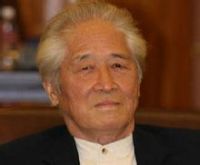Bai Hua
Bai Hua (白桦), the pseudonym of Chen Youhua (陈佑华), is a full-time writer at the Shanghai branch of the Chinese Writers’ Association.
Born on Nov. 20, 1930 in Xinyang, Henan Province, he was nurtured on the ballads and popular librettos his mother brought home from the countryside. In 1938, Bai’s father was buried alive by the Japanese soldiers during the occupation of Xinyang. Bai and his elder brother were forced to go to their uncle’s home and studied at a private school his uncle ran.
At the end of the War of Resistance against Japan in 1945, Bai Hua returned to his hometown, where he studied first in Xinyang Normal School and then in Huangchuan High School. In 1946, Baihua published his first poem in “Zhongzhou Daily”, which deals with the desperate life of weavers in the local mill. Before long, together with his schoolmates, he launched a periodical. In 1947, the underground organization of the Communist Party of China (CPC) sent Bai Hua to the Kuomintang controlled area. In the autumn of that year, he joined the People’s Liberation Army, where he did publicist work. Later on, Bai Hua took part in many well-known military campaigns in central China. He joined the party in 1949.
In the early 1950s, he worked as the head of creative writing group in Kunming Military Command and as a member of the creative writing section of the General Political Department of the People’s Liberation Army. During this time, Bai Hua wrote many short stories, including, “Bamboo Whistle”, “Horse Bells Ring in the Mountains”, and “Embroidered Scarf”. Dealing with the life and struggle of soldiers and ethnic minorities in the southwestern border area, these stories are imbued with local flavor.
In 1958, soon after being labeled a Rightist, Bai Hua was driven out of the army, and send down to work as a pipe fitter in a rural factory. Three years later, he was transferred to work as a screen writer at the Haiyan Film Studio in Shanghai. In 1964, he once again enrolled in the army, serving as a playwright for the troupe in the Wuhan Military Command.
Since the fall of the Gang of Four, Bai Hua has written many new works. “The Stars Gleam More Brightly Tonight”, a film script, describes in a fresh and lyric style the noble spirit of young soldiers who contributed their youth, and often, their lives, to the liberation of the country during the Huaihai Campaign. “Daybreak”, a play, portrays the vivid image of General He Long (1896-1969). However, “Unrequited Love”, a film script written in collaboration with Peng Ning, aroused controversy soon after its appearance in 1979, and was publicly criticized in newspapers.
Bai Hua is a prolific and versatile writer. Apart from short stories, novelettes, plays, and films scripts, he has also written poems, of which “Spring Tide in Sight” won the Prize for Best Poem written during the years 1977 to 1980.
His main works include “Cherish the Memory of Jinsha River”, “Peacock”, ”Horse Bells Ring in the Mountains”, “Feeling and Thoughts”, “Unrequited Love”, “Spring Tide in Sight”, “The Stars Gleam More Brightly Tonight”, “The Story of Kong Guojian”, “A Budle of Letters”, and “The Faraway native Land”.
